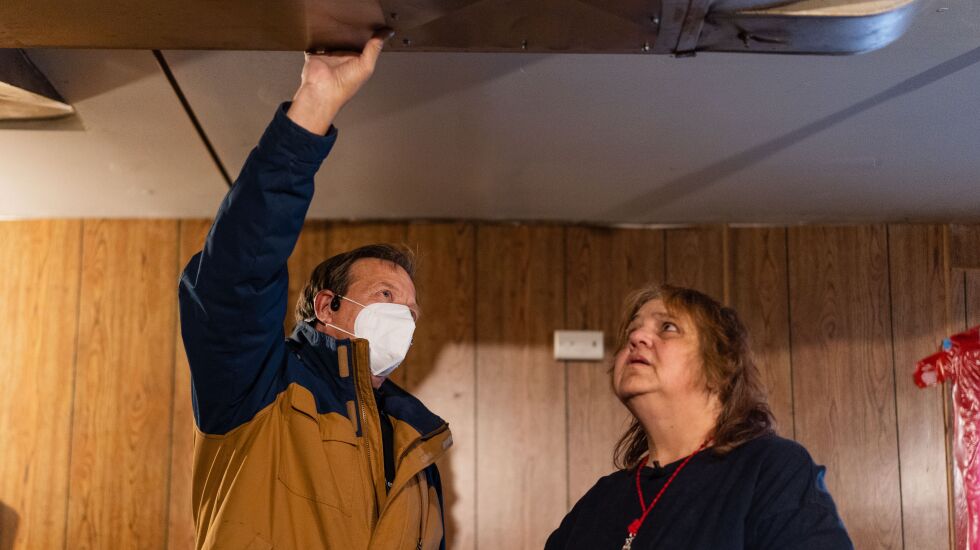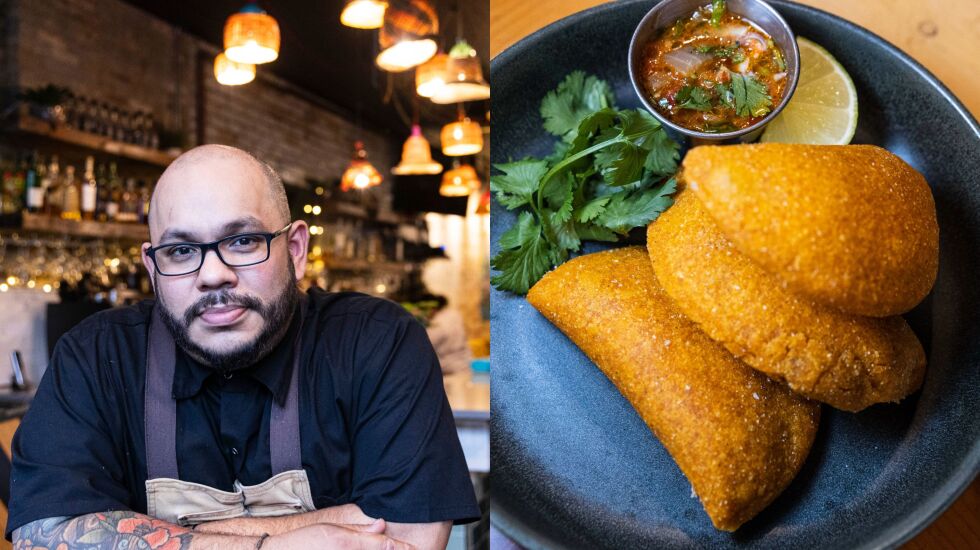
Good afternoon. Here’s the latest news you need to know in Chicago. It’s about a five-minute read that will brief you on today’s biggest stories.
This afternoon will see snow showers and a high near 36 degrees. Similar weather will continue into tonight with gusts as high as 25 mph and a low near 30. Tomorrow will also see snow showers with a high near 31.
Top story
ComEd to spend $40 million on plan to rid homes of natural gas
Florence Pacheco has struggled to stay cool during hot summers and warm through cold winters for over four decades in her Hermosa home.
So when she was offered an opportunity to have her gas furnace swapped out for a more efficient electrical system in her worker’s cottage at no cost to her, she enthusiastically agreed.
“Never, ever in my lifetime could I afford it,” said Pacheco, a widow who lives on Social Security checks. “Thank you, Jesus.”
Through a ComEd initiative, Pacheco, 69, now has an energy-efficient heat pump that provides warmth in the winter and air conditioning in the summer. She has new wall and attic insulation. She also got an electric heat pump for her hot water, replacing a natural gas model. She’s eventually going to get a new electric hookup for cooking to make her home less reliant on fossil fuels that contribute to the climate crisis.
The total cost so far is almost $63,000, and it is paid for under the program for low-income residents sponsored by electric utility ComEd and the nonprofit Elevate.
Working with Elevate and other organizations, ComEd is moving from a pilot program to convert 100 homes to a much larger-scale project with the goal of spending $40 million over the next three years. That plan will potentially convert thousands of homes across the Chicago area and elsewhere in northern Illinois.
About 1.3 million ComEd customers — about one-third of the utility’s total — are in the city of Chicago.
The program also includes follow-up inspections to make sure everything is working correctly. ComEd officials say the utility will fund 100% of single-family homes and up 70% of multi-family buildings that qualify. They expect several hundred conversions next year and plan to increase the numbers through 2025.
The expected benefit to Pacheco and others is lower utility bills, more efficient heating and cooling and a reduction in the use of natural gas, which contributes to the climate crisis.
Brett Chase has more on the program here.
More news you need
- An off-duty Chicago police officer was found dead this morning after suffering an apparently self-inflicted gunshot wound in Norwood Park. This is the latest suicide this year in a department grappling with a mental health crisis, our Tom Schuba reports.
- City Council yesterday agreed to provide funds to help build a controversial new $150 million high school on the Near South Side. Critics say the plan could harm nearby schools that are already facing dwindling enrollment, draining them of funding and students. Others are angry at the plan to build the school on land that was slated for public housing.
- Another notable ordinance passed yesterday will make it easier to ticket and tow drivers parked in bike lanes — and requires signs to warn bikers of closed lanes. The Bike Lane Enforcement Ordinance also raises fines to $250 for drivers blocking paths.
- Alderpeople also yesterday approved an ordinance empowering Chicago police officers to issue “administrative notices of violation” for the crime of illegal gun possession. First-time offenders face a $5,000 fine and up to 90 days in jail. A second offense would carry a fine of up to $20,000 and 180 days in jail.
- Rivian and Lion Electric — two electric truck makers with Illinois operations — are pressuring Gov. J.B. Pritzker to commit to more aggressive state policies that phase out large gas and diesel-engine vehicles. They joined 14 other businesses connected to electric vehicles and clean energy in sending a letter urging Pritzker to set specific targets for eliminating large polluting vehicles.
- CTA and Pace suburban buses announced that, beginning early next year, they will offer one-day, three-day, seven-day and 30-day unlimited-ride passes that can be used on both transit systems. Our Mitch Dudek has more on the shared passes here.
- Lastly, the Biden administration is again making some free at-home COVID-19 tests available as part of its plans for potential coronavirus surges this winter. You can order four rapid tests through covidtests.gov here.
A bright one
Chicago chef Rodolfo Cuadros shares his beef empanadas recipe
In another iteration of our “Holiday dining at home” series — where we ask Chicago-area chefs to share their favorite holiday recipes — we talked with local chef Rodolfo Cuadros.
For Chef Cuadros, he chose to share his recipe for Colombian Beef Empanadas — a dish perfect not just for the winter holidays, but also for any gatherings year-round.
“Empanadas are the quintessential shareable dish of Colombian culture,” Cuadros said. “It’s not just a dish for eating at specific holidays, it is eaten all year round because of its deep flavors, portability and shareability.”
Cuadros, who owns Amaru in Wicker Park (1904 W. North Ave.), told the Sun-Times that this dish is deeply intertwined with most of his childhood memories.

“Every single family event that I can remember, there was always a group of mothers, aunts and cousins working together to create this incredibly humble dish that is deeply rooted in Colombian culture,” Cuadros said.
“Every single time they were working on empanadas during a family event, I was hiding under the table waiting impatiently so I could steal the first empanada before anyone else could get their hands on them!”
The recipe calls for beef chuck roll, beef stock, onions, garlic, carrots, thyme sachet, paprika, oregano, cumin, Yukon potatoes, tomato paste, cilantro, achiote paste and arepa harina.
Cuadros shows you how to put it all together in his full recipe here.
From the press box
- Longtime Bears analyst Hub Arkush briefly returned to his syndicated show today, four months after suffering a heart attack. Jeff Agrest spoke with Arkush about his recovery and how he’s feeling now.
- Our experts make their Bears-Eagles picks for Sunday’s game.
- The Cubs and right-hander Brad Boxberger have agreed to a one-year deal.
Your daily question☕
Should parents tell their kids Santa isn’t real? Tell us why or why not.
Send us an email at newsletters@suntimes.com and we might feature your answer in the next Afternoon Edition.
Yesterday we asked you: What’s your reaction when someone from a suburb says they’re from Chicago?
Here’s what some of you said...
“Oh? what neighborhood? Or what parish?” — Thom Clark
“I see it all the time when I’ve relocated to other states. I’m from the South Side of Chicago, and if I meet somebody and they say they’re from Chicago, and I say, ‘What part?’ And if they say Aurora, or Joliet — blank stare. They get the look.” — Angela Findley
“Chicago is Chicago. It is not Oak Lawn or Cicero. When I know that a person is from a suburb and they say they are from Chicago, I call them out on it. When I ask what neighborhood they are from, and they respond with a suburb, I respond with, ‘Oh you are from the Chicago Area.’” — Irene Lathrop
“It doesn’t bother me at all. I lived in Oak Park when I was growing up and I would say I was from Chicago I found that less explaining was required because most people have heard about Chicago, while significantly less have heard about Oak Park. If the questioner would dig deeper and ask me which part of the city I was from, I would then explain that I was from Oak Park, a suburb that borders the city. Bottom line: suburbanites say they are from Chicago because it’s easier.” — Mary Gignilliat
“I’m outraged. As a Loop resident, it’s most annoying to hear someone claim to live in Chicago when they’re a suburbanite. It usually happens when we are traveling overseas. I always correct these wannabes, often interrupting their conversations with other people to inform them that they are not from Chicago. The worst case was when someone from Racine claimed to be a Chicago resident.” — David Matthews
“I assume they don’t know how well the person they are speaking with knows the area. I’ve lived both in the city and the suburbs. When traveling, if someone asks where I’m from, I say Chicago because everyone knows where that is. If they then ask what part, they clearly know the area so I answer more specifically. Otherwise, we’re simply exchanging pleasantries, and no one wants a long answer to those.” — Suzanne Shelton
“I say ‘Chicago suburbs’ but I’m trying to train my teenage son out of saying he’s from Chicago since we’re not from Chicago, sigh.” — Helen Lee
“So, I’m only annoyed when it’s used to overstate their experience or the Suburb is more than 30 miles away. Suburban kids would go to Chicago as an event. They experienced specific things. They did not experience living in the city proper and all that comes with it. That being said, not even everyone inside the city experiences all it has to offer. If you’re from Libertyville, don’t pretend to understand the Southside or the west side. Just go to your Cubs game, drink, enjoy the city and move on.” — John C. Forst
“I was once accused of having a ‘Chicago’ attitude. I replied, ‘Rockford, much worse.’” — Becky Crawford
Thanks for reading the Chicago Sun-Times Afternoon Edition. Got a story you think we missed? Email us here.







